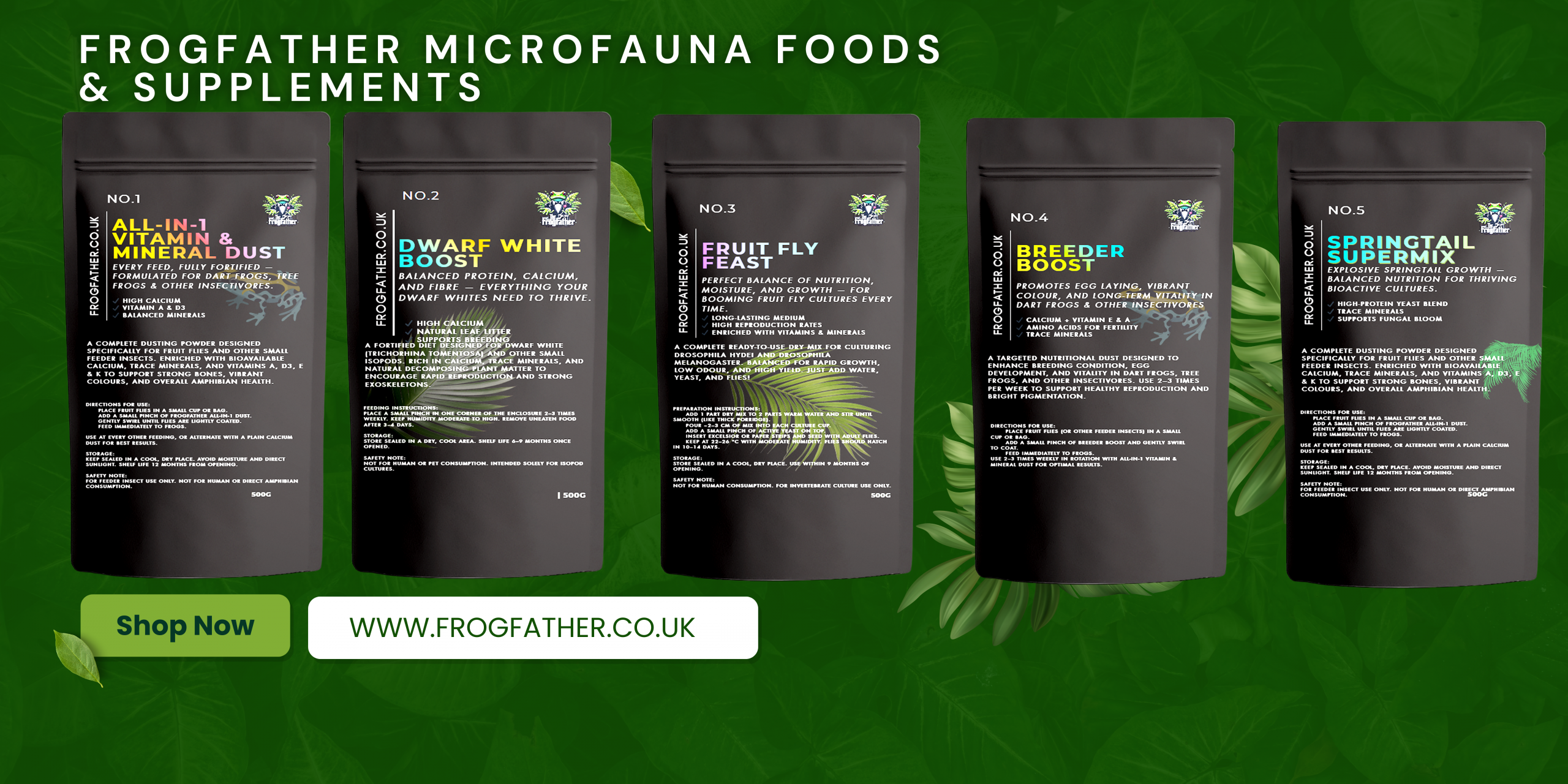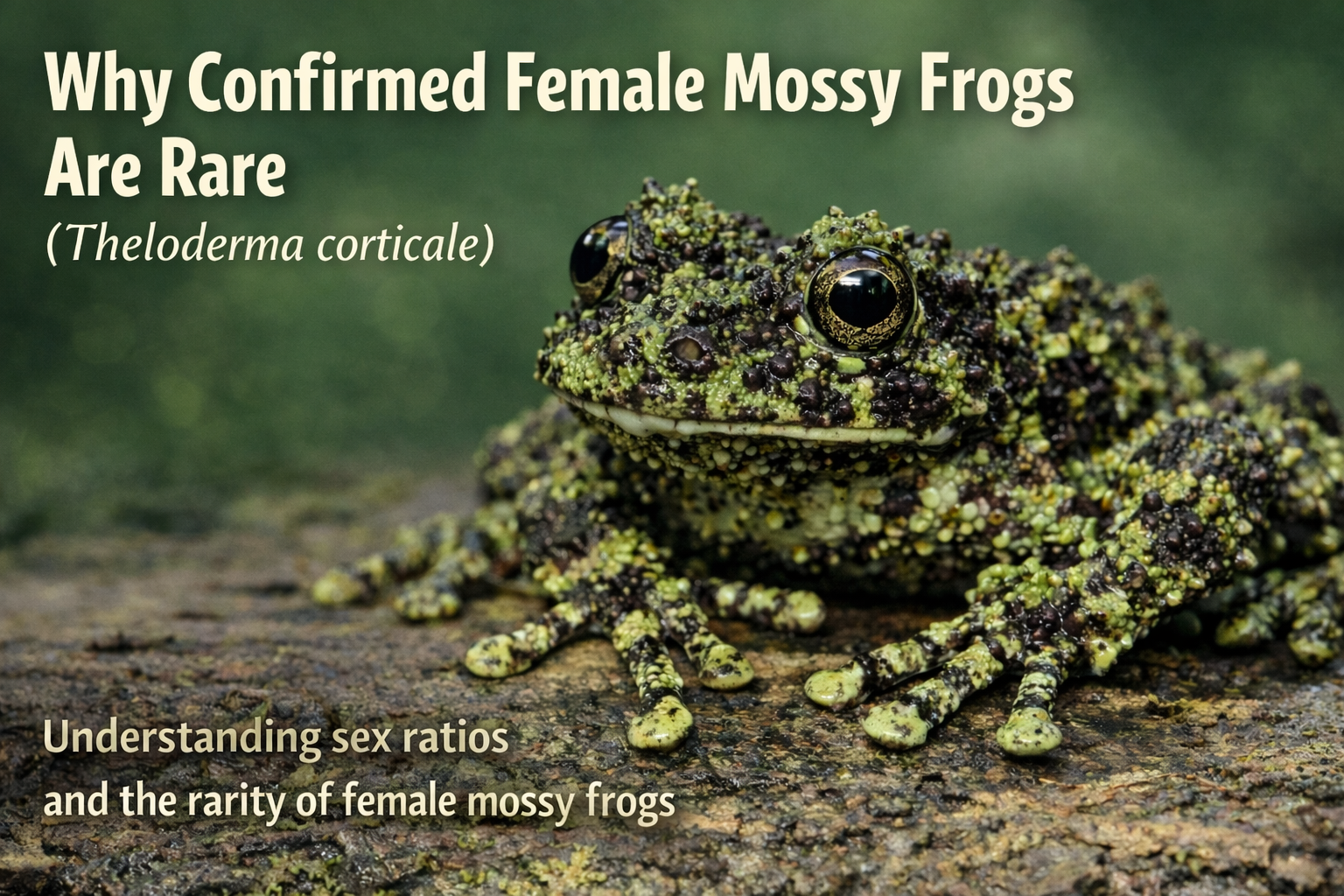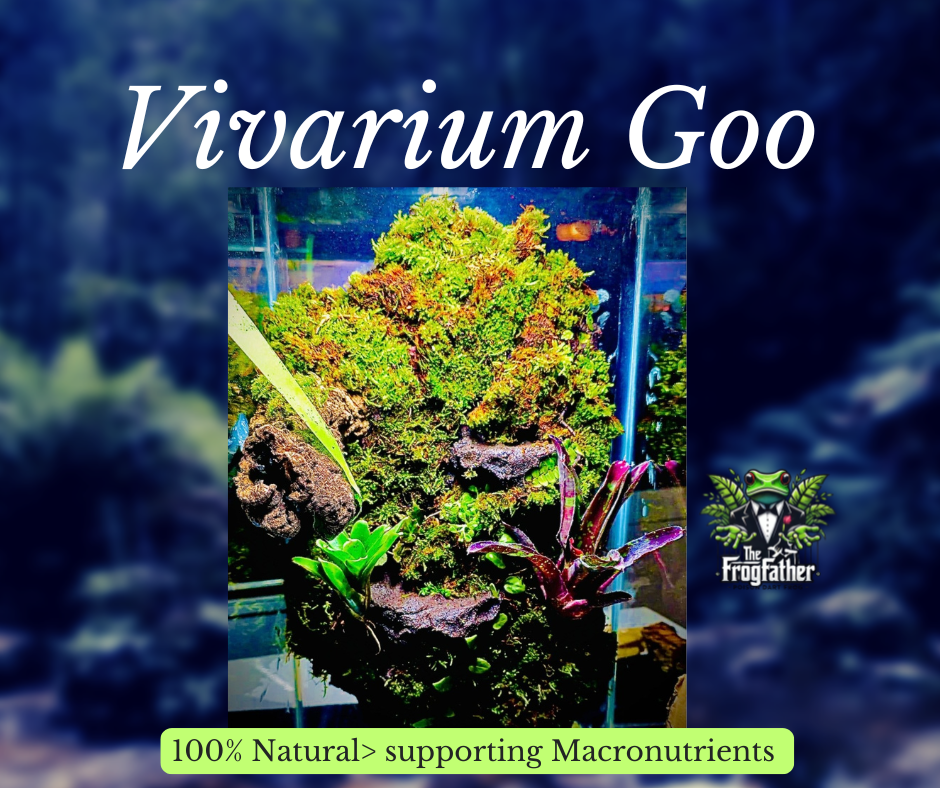If you’ve ever tried to keep dart frogs, isopods, or springtails long-term, you’ll know one brutal truth: your animals are only ever as healthy as the tiny creatures you feed them. And for years, I was constantly battling with cultures crashing, weak feeders, slow breeding dwarf whites, mouldy fruit fly tubs, and frogs that just weren’t getting the nutrition they needed.
So, I did what most of us do. I tried every DIY mixture possible — brewers yeast, fish flakes, rice flour, bits of cuttlefish bone, calcium carbonate — you name it. Some batches exploded with life, others died in a week. And worst of all? Nothing was consistent.
Fast forward several years, hundreds of cultures, and more failures than I’d like to admit… and that’s when things finally changed. I started working with a UK-based vitamin and mineral manufacturer — the kind that normally supply human nutrition companies — and together we developed a range of microfauna diets made using human-grade ingredients, blended under laboratory conditions, and fine-tuned from my own small-scale testing on frogs, isopods, lizards and fruit fly colonies.
This became the Microfauna Foods & Supplements range — a complete system designed to make your feeders thrive, so your animals thrive too.
What Makes This Range Different?
This isn’t rebranded chicken feed or crushed dog biscuits in a bag. Every product in the range is:
- Made with human-grade ingredients – the same standard used in supplements for people.
- Blended in the UK by specialist vitamin and mineral manufacturers to precise specifications.
- Tested for years in real dart frog rooms, isopod tubs and lizard enclosures — not just theory.
- No fillers. No guesswork. No gimmicks. Just formulas that work, every time.
And it’s not just one product. It’s a full ecosystem built to fix the exact problems keepers face daily:
- Springtail Supermix – for explosive springtail growth without cultures crashing.
- Dwarf White Boost – accelerates isopod breeding and shell health.
- Fruit Fly Feast – no-odor media that produces dense melanogaster & hydei cultures.
- All-in-1 Vitamin & Mineral Dust – replaces multiple supplement jars and confusing schedules. Just dust & feed.
- Breeder Boost – fertility and egg-laying support for breeding frogs.
Why Microfauna Matter More Than You Think
Healthy frogs don’t start with calcium powder. They start with what your feeder insects eat.
Springtails clean waste, isopods break down organics, fruit flies fuel your frogs… but if those feeders are underfed, lacking nutrients, or dying off — your animals are surviving, not thriving.
So in this guide, I’ll break down exactly how to grow stronger, cleaner and more nutritious microfauna using the same methods I use in my own frog room. And I’ll show you how this new product line finally solved problems I battled with for years.
Springtails – The Foundation of a Healthy Bioactive Setup
Springtails are often the first microfauna people culture, and also the first to fail. They’re tiny, easy to overlook, but absolutely essential for every bioactive tank. They break down mould, waste and decaying leaf litter — and for dart frog keepers, they’re also an important first food for froglets.
But here’s the problem… springtail cultures crash. A lot. One week they’re booming, the next they smell sour, turn brown, or dry out completely. I’ve had charcoal tubs drown in stagnant water, clay ball cultures grow mouldy overnight, and soil cultures disappear without warning.
Why Most Springtail Cultures Fail
- Mould or yeast explosions that suffocate the culture.
- Too dry or too wet – water pooling or total dehydration.
- Boring food – rice flour and yeast work short-term, but lack long-term nutrition.
- No protein or minerals – weak cultures mean fewer springtails for your frogs.
I tried every DIY trick – rice, oats, fish food, nutritional yeast, mashed sweet potato – and while some worked for a while, none of them gave stable, long-term results. I wanted something that didn’t just feed springtails… I wanted something that made them explode in population and stay stable for months.
The Solution: Springtail Supermix
Springtail Supermix is the exact formula I now use for every springtail culture in my frog room. It’s part of our Microfauna Foods & Supplements range, made using human-grade ingredients and blended in UK laboratory conditions.

What makes it different?
- Explosive growth – cultures boom within 7–10 days.
- No foul odours or crashes – keeps microbial balance stable.
- Works on charcoal, clay balls, soil or ABG mix.
- Tested on dart frog, isopod and reptile setups for years.
You don’t need to guess measurements. You don’t need five ingredients. Just sprinkle a pinch into the culture once a week and mist as normal. That’s it.
How I Use Springtail Supermix (My Method)
- Start a culture with charcoal, clay balls or soil.
- Add springtails (from an existing culture or a starter culture).
- Sprinkle a tiny pinch of Springtail Supermix on the surface.
- Mist lightly – not soaking wet, just humid.
- Repeat feeding every 5–7 days or when food disappears.
Within two weeks, you’ll see clouds of springtails covering the surface. No mould, no rot, no guessing.
Next, let’s talk about isopods – especially dwarf whites – and why most people accidentally starve them…
Dwarf White Isopods – Small but Essential to Every Bioactive Setup
Dwarf white isopods are one of those species that almost every dart frog keeper ends up using. They’re small enough not to bother eggs or froglets, they bury themselves in the substrate, and they quietly work away as the backbone of any clean-up crew.
But ask anyone who’s tried to culture them seriously and you’ll hear the same frustrations again and again:
- “They started well… then the colony slowed down.”
- “They’re alive, but they’re barely breeding.”
- “Why are there loads of springtails but barely any isopods?”
- “Their shells look soft and pale – are they missing calcium?”
Why Most Dwarf White Cultures Plateau
Dwarf whites are tougher than springtails, but they still need more than just leaf litter to truly thrive. In most cases, isopod cultures slow down because:
- No protein source – leaf litter alone isn’t enough for breeding females.
- Lack of minerals – results in soft exoskeletons, failed moults and weak offspring.
- Over-reliance on calcium carbonate only – calcium isn’t enough without magnesium and trace minerals.
- Dry conditions – dwarf whites need a permanently damp zone to breed successfully.
I made all these mistakes too. For years I was giving them cuttlefish bone, porridge oats and the occasional vegetable scrap, but my colonies never exploded in numbers the way I wanted… until I changed how I fed them.
The Solution: Dwarf White Boost
Dwarf White Boost is part of our Microfauna Foods & Supplements range and was designed specifically for breeding dwarf white isopods at scale. It’s made with human-grade ingredients and produced under UK laboratory conditions – the same standards used for reptile vitamin blends and human supplements.

What makes it different?
- Speeds up breeding cycles significantly – more females carrying mancae (babies).
- Supports proper moulting and harder exoskeletons – no more soft-shell deaths.
- Provides long-term nutrition – not just carbs or calcium, but a balanced diet.
- Tested in my own frog and isopod setups for years until we got the formula just right.
How I Feed Dwarf Whites Using Dwarf White Boost
- Keep one side of the tub damp with sphagnum moss, the other side drier with leaf litter and cork bark.
- Add a small pinch of Dwarf White Boost once or twice a week on the feeding side.
- Leave cuttlebone or a calcium source in the corner for constant grazing.
- Replace leaf litter every few weeks to maintain microbe diversity.
Within a few weeks, you’ll notice more juveniles, more buried adults and zero die-offs after moulting. This is exactly how I produce thousands for my frog and gecko setups.
Next up — fruit flies. The one feeder we all rely on daily… and the one that fails the most without a good culture media.
Fruit Flies – The Lifeline of Every Dart Frog Keeper (and the Most Frustrating)
If you keep dart frogs, geckos or mantellas, fruit flies aren’t just “another feeder” – they’re your main food source. But they’re also the one culture that seems to go wrong the most.
Over the years, I’ve had cultures that:
- Exploded with mites and collapsed within days.
- Turned into a smelly vinegar swamp.
- Grew a thick blanket of white mould overnight.
- Only produced a handful of flies – or worse, none at all.
I tried every DIY recipe I could find – mashed potato flakes, banana purée, porridge oats, honey, brewers yeast, even repashy mixed with coffee filters. Some worked for a week, some for two… but none stayed stable long-term. Cultures just crashed too fast.
So, over several years of breeding dart frogs and running hundreds of cultures at a time, I kept experimenting and adjusting small things – moisture levels, vitamins, protein sources, natural mould inhibitors – until I found a mix that consistently:
- Doesn’t mould or sour
- Doesn’t attract mites easily
- Produces flies for 4–5+ weeks
- Smells neutral – not like vinegar or rot
And that’s how Fruit Fly Feast was born.
Introducing Fruit Fly Feast
Fruit Fly Feast is part of our Microfauna Foods & Supplements range. It’s made using human-grade ingredients and blended in UK laboratory conditions by a specialist manufacturer to our exact formula.

This isn’t just another potato flake base. This is a fully balanced, tested, repeatedly refined formula developed over years of small-scale testing with our own dart frogs, isopods and reptiles.
- Works with both Drosophila melanogaster & Drosophila hydei
- Boosts hatch rates and culture life to 4–5 weeks
- No overpowering vinegar smell – safe to keep indoors
- Built-in mould & mite resistance without harsh chemicals
Next: How to mix it, water ratios, and how we run 20+ cultures at a time without a single mould outbreak.
How to Use Fruit Fly Feast (My Exact Method)
After years of tweaking recipes, this is the method that gives me reliable, high-producing cultures every single time. No mould. No vinegar smell. No sudden crashes.
🧪 Mixing Instructions (Per Culture)
- 1 level tablespoon of Fruit Fly Feast
- 2–2.5 tablespoons of warm water (not boiling)
- Stir until it forms a thick yoghurt-like paste
- Let it sit for 1–2 minutes to absorb and thicken
It should not be runny. If it slides when you tilt the pot, it’s too wet. If it cracks when you touch it, it’s too dry – add a few drops of water and mix again.
🐛 Setting Up a New Culture
- Spoon the mixture into an 8oz or 16oz culture cup.
- Add a handful of coffee filters or wood wool for climbing space.
- Tap in at least 30–50 adult flies (melanogaster or hydei).
- Secure breathable fabric or a ventilated lid to prevent escapes.
Keep cultures at 22–25°C (room-temp is fine for melanogaster – hydei prefer slightly warmer).
How Long Does It Last?
Once established, cultures using Fruit Fly Feast typically:
- Produce flies for 4–5 weeks without collapsing
- Stay mould-free and smell-neutral
- Show visible maggots within 3–4 days
- Have peak production around day 10–18
When the first culture peaks, I use it to seed two or three more using the same mixture. This keeps a steady cycle going for froglets and adult frog feeding.
All-in-1 Vitamin & Mineral Dust – No More Guesswork, No More Cupboards Full of Supplements
We’ve all been there – a shelf full of tubs: calcium, calcium with D3, multivitamins, carotenoids, bee pollen, spirulina… and the constant question:
“Did I dust with D3 last time? Should I be using multivitamins today? Am I overdosing? Underdosing?”
That’s exactly why we created the All-in-1 Vitamin & Mineral Dust.
It’s part of our Microfauna Foods & Supplements range and has been tested for years on our own dart frogs, tree frogs, lizards and even isopods.

This isn’t a repackaged reptile powder. It’s a completely custom formula, using human-grade ingredients, blended in a UK vitamin and mineral laboratory to our exact ratios, designed specifically for:
- Dart frogs (Ranitomeya, Dendrobates, Phyllobates, Oophaga)
- Tree frogs, day geckos, small lizards
- Fruit flies, springtails and microfauna feeders
Why Keepers Love the All-in-1 Dust
- No more guesswork – one tub does it all: calcium, D3, vitamins, minerals and colour enhancers.
- No more 5-bottle routine – replaces separate tubs of calcium, Vit A, multivitamins, and carotenoids.
- Safe daily use when fed correctly (light, even coating – not clumps).
- Improves colour, egg quality and longevity in breeding dart frogs.
- Lab-formulated and tested for years on our own collection before release.
How I Use It (Simple Routine)
- Put fruit flies or microfauna in a deli cup or shaker pot.
- Add a tiny pinch of All-in-1 Dust.
- Shake gently until flies are lightly coated – not clumped.
- Feed directly into vivariums or feeding ledges.
That’s it. No rotating five tubs. No spreadsheets. Just consistent, balanced nutrition every feed.
Breeder Boost – Egg Development, Fertility & Tadpole Survival Made Easier
Breeding dart frogs and other microfauna isn’t just about pairing a male and female and hoping for the best. Healthy egg production depends on:
- Correct calcium-to-phosphorus ratios
- Vitamin A (but not too much) for proper egg membrane development
- Vitamin E and D3 for fertility and calcium use
- Trace minerals that support hormone regulation and yolk formation

Too little of these, and you get infertile eggs, jelly-like clutches, egg rot or weak tadpoles. Too much, and you risk hypervitaminosis – especially with Vitamin A or D3 excess.
That’s exactly why we created the Breeder Boost Egg-Laying Formula.
It’s part of our trusted Microfauna Foods & Supplements range, designed after years of experimenting with our own Ranitomeya, Dendrobates, Ameerega and Phyllobates frogs.
Every ingredient is human-grade and produced in UK laboratory conditions by a specialist vitamin and mineral manufacturer to our exact specification.
What Makes Breeder Boost Different?
- Improves clutch size & fertility rates naturally – no hormone use.
- Supports stronger egg membranes – fewer collapsed or mouldy eggs.
- Increases viable tadpole development before and after hatching.
- Safe for long-term breeding rotations – balanced, no mega doses.
- No need for extra bee pollen, spirulina, Vit A drops or complex rotation charts.
How I Use Breeder Boost (Simple & Proven)
This is the exact protocol I use in my frog room:
- Use All-in-1 Vitamin & Mineral Dust for every normal feed.
- Twice a week (max), swap to Breeder Boost instead of All-in-1.
- Dust fruit flies lightly, never clumping – tap off excess before feeding.
- Continue this for 2–3 weeks for conditioning adults before breeding.
Within a month, most of my proven pairs show:
- Brighter feeding response
- Rounder abdomen in females
- Increased calling from males
- Larger, firmer egg clutches
And unlike many DIY mixes, this formula won’t cause Vitamin A toxicity or leg deformities in tadpoles when used correctly.
Frequently Asked Questions – Microfauna Foods & Supplements
❓ Do I need different supplements for fruit flies, springtails, and isopods?
No. That’s the whole reason we created this range. Each product is designed for a specific purpose, so you don’t have to guess or mix your own blends. For example, Springtail Supermix boosts springtail cultures, Dwarf White Boost is formulated for isopods, while All-in-1 Dust handles daily feeding for frogs.
❓ Are these mixes safe for dart frogs and amphibian tadpoles?
Yes. We tested all formulas for years with our own Ranitomeya, Dendrobates, Phyllobates, and Ameerega species. Each blend uses human-grade ingredients and is produced in a UK laboratory to ensure accuracy, cleanliness, and consistency.
❓ What makes your mixes different from homemade recipes (brewer’s yeast, oats, cuttlebone etc.)?
Homemade recipes often give a short-term boost but lack minerals, vitamins, microbial balance, or mould resistance. Our formulas include everything springtails, isopods, or frogs need — in the right ratios — meaning faster breeding, fewer die-offs, and zero guesswork.
❓ How often should I feed Springtail Supermix or Dwarf White Boost?
Once or twice a week is enough. A thin sprinkle across the culture surface works best. Overfeeding can cause excess moisture or mould, so less is more.
❓ Can I rotate All-in-1 Dust with other supplements?
You don’t have to — that’s the whole advantage. The All-in-1 formula already contains calcium, D3, vitamins, trace minerals, and pigments. If breeding, you can rotate with Breeder Boost twice a week.
❓ When should I start using Breeder Boost?
Use Breeder Boost 2–3 weeks before breeding begins, especially if your frogs are just coming out of a dry period or brumation. It helps females build healthy eggs and increases clutch strength and fertility.
❓ Are these products available in different sizes?
Yes. All formulas come in 500g or 1kg eco-friendly pouches — perfect for both home hobbyists and breeders with multiple cultures.
❓ What category are they under?
The full range is available under our dedicated collection: Microfauna Foods & Supplements.
Ready to Boost Your Cultures and Frog Health?
We didn’t create these mixes in a boardroom — they were developed in our frog room. Every recipe in the Microfauna Foods & Supplements range has been tested over years with our own dart frogs, geckos, lizards, isopods and springtails. When cultures crashed, we adjusted. When frogs laid weak eggs, we reformulated. And when it finally worked — we made it available to you.
Now you can use the exact same formulas we trust every single day:
- ✅ Springtail Supermix – explosive springtail growth, no mould.
- ✅ Dwarf White Boost – stronger shells, faster breeding isopods.
- ✅ Fruit Fly Feast – stable cultures for 4–5 weeks, no sour smell.
- ✅ All-in-1 Vitamin & Mineral Dust – no more supplement guesswork.
- ✅ Breeder Boost – fertility, egg strength and healthy tadpoles.
Whether you keep one vivarium or fifty, this range is designed to make your life easier — and your animals healthier.
✔ Order now, choose 100g or 200g pouches, and feed with confidence.



